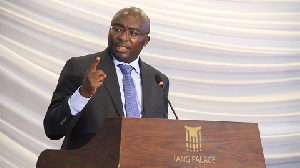Most of the damage to Ghana's economy in recent times has been done by credit facilities and their high interest rates.
The Vice - President, Dr Mahamudu Bawumia, has taken some measures to blunt the impact of conventional forms of loan pressures by introducing debt reprofiling to save the country from default.
Reprofiling means lengthening the maturity of bonds while preserving principal and generally the coupons.
The approach offers government more time to restore economic growth and get its debt obligations under control.
Dr Bawumia said on Easter Monday that: "last Friday, Ghana issued a bond essentially to do debt re-profiling and in that context, we raised some US$2.25 billion investment that came in to buy this cedi dominated bond.
There was a cedi bond which was issued for 15 years’ tenure and that brought in US$2.25 billion dollars.
What is so remarkable about this transaction is that, we have been able to re-profile our debt, get more foreign exchange without increasing our debt stock and that is so remarkable.”
An added voice by the Deputy Finance Minister, Charles Adu Boahen, that government is burdened to always find GH¢1 billion every week to repay its debt is worrying. "Every week, we will have to scramble to find a billion cedis to pay off our short-term debts or refinance it, meaning we will have to find investors to roll over or not all of them would want to roll over," he said.
Piling up debt is very damaging to every economy; thus, the key reason to restructure our debt is that the economic situation remains unstable.
Timely reprofiling of debt causes less damage to bond yields, future market accessibility and good credit rating.
The move to reprofile by replacing more expensive debt with less expensive ones is a smart move to avoid exploding sovereign debt that stood at GH122 billion by December 2016.
Dr Bawumia has recognised the danger in default through his quest to stabilise the economy, hence, taking the crucial decision.
The prevailing condition of borrowings has raised fears that the new government is going to borrow more for debt servicing but it seems there is a strategy to minimise it.
It is important to prevent revenue accrued from especially taxes, simply going to pay off the country's creditors.
Government seems not ready to reduce the level of our reserves by a few million dollars to pay for expensive existing debt.
We have to take note that when debt level is high revenue inflows dry out. Additionally, investment tends to fall as debt rises beyond safe limits.
The result of this is investors losing confidence, demanding falls to low levels, and interest rate begins to rise, leading to massive capital flight.
The Vice President has taken a step that can foretell a possible decline of fiscal deficit. Debt reprofiling, slow increase of public debt, decline in interest rates, reduction in over pricing of development expenditures and an increase in non-tax revenue, should help bring down fiscal deficit of 9 percent in 2016.
The best acceptable and practical solution for our huge debt level is the one that would stimulate investment and institute reforms on sound management of exchange rate.
We have already witnessed the increase in Ghana's forex reserve to $8 billion from all time $6 billion dollars since independence to stabilise the cedi against the dollar.
Dr Bawumia wants to limit the risk of the new government being dragooned into increasing our debt stock. Given the uncertainty over the country's near-term prospects, the smartness in reprofiling our debt is precisely what we need to weather the storm of our mountainous debt.
Business News of Monday, 24 April 2017
Source: B&FTonline

















